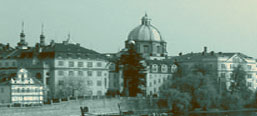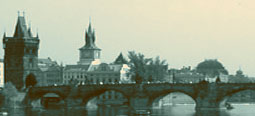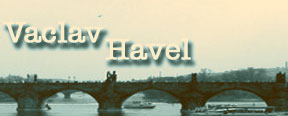Presidential
Chronology
Constitutional
Powers
Presidential
Activities and Accomplishments:
General
Summary
Initial
Presidential Term (1989 - 1992)
Presidential
Term (1993 - 1998)
Last
Presidential Term (1998 - 2003)
Presidential
Statistics
Post
- presidency
|
The
President
Presidential
Chronology (1989 - 2003)
- December
29th, 1989: After the establishment of a constitution, Vaclav
Havel was elected as the country's new, nonpartisan president,
and inaugurated at the presidential seat of Prague Castle.
- June
1990: Reelected for a term extending to 1992
- July
20th, 1992: Movement for a Democratic Slovakia emerges as Slovakia's
leading party, opening the floodgates to Slovakian nationalistic
movement for autonomy. Havel resigns from office to show disapproval
of and unwillingness to preside over this impending "Velvet
Divorce"
- January
1st, 1993: Official dissolution of Czechoslovakia as a united
country to form Czech Republic and Slovakia occurred January 1st,
1993
- January
26th, 1993: Havel put back in office by election as President
of the new Czech Republic.
- 1998:
Commences and is determined to carry out his final term as president
(as in accordance with the parliamentary limit of 2 consecutive
5-year presidential terms), despite doubts about his ability to
rule, which pervaded on account of a series of earlier medical
complications.
- 2002:
Hosts and organizes NATO summit at Prague, the capital of Czech
Republic, which doubled as an event of international farewell
to his presidency. It was attended by important international
figures including U.S. President George W. Bush, British Prime
Minister Tony Blair, French President Jacques Chirac, in addition
to most eminent European leaders.
- February
3rd, 2003: Official term termination after 13 years as president
of the Czech Republic, in addition to two years as leader of the
initial, united Czechoslovakia after Communist Reign.
Constitutional
Powers
By the Articles
62, 63 and 64 of the established constitution of the Czech republic,
as president, the president of Czechoslovakia has the authority
to wield a range of executive powers pertaining to a variety
of institutions. These include, but are not limited to Parliament,
the army, and various state institutions such as that of higher
education, the Banking Council of the Czech National Bank, the
Supreme Inspection Office, the Office for the Protection of
Economic Competition, the Securities Commission and the Personal
Data Protection Office etc. In an analogous check and balances
relationship, a Czech president also has a hand in legislature.
In combination with the Speaker of the Chamber of Deputies,
as well as the Prime Minister, any one of the three can exercise
the right not to sign an act passed by the two chambers of Parliament
(with the exception of constitutional laws). The president has
the unique privilege of appealing to the Constitutional Court
to repeal laws, or parts thereof while in office, and is entitled
to participation at all government meetings.
Presidential
Activities and Accomplishments:
General
Summary
During
his presidency, Havel was known to have kept strong contact with
the Parliament, delivering speeches in both the Chamber of Deputies
and well as the Senate. He worked actively in the government by
meeting regularly with leaders of the two chambers, the Prime
Minister, committee or commission representatives, and other deputies
and ministers of the state. In addition to this, Havel also regularly
reached out to regional representatives, local authorities and
a variety of apolitical public associations through internal trips
around the country to better diagnose and understand problems
on a smaller, more intimate scale. While he held power, he used
it not only to dedicate himself to concerns of a political nature
such as those of the constitution, legal and legislative procedure,
political parties and operations of the democratic core, but also
to extend personal attention to a spectrum of everyday problems
including human rights, other aspects of civic society, as well
as environmental development issues that may impact future generations.
Initial
Presidential Terms (1989-1990 Interim; 1990 -1992)
Elected
as interim president in 1989, he was formally reelected in June
of 1990 for a term extending to 1992. Havel sought to restore
the national pride and tradition of Czech Republic and its rich
culture, as well as the integrity of the presidential position
by restoring the Prague Castle residence, in addition to honoring,
once again, important state holidays, celebrations of prominent
people, and anniversaries of commemorative events. In the years
following, he began movements of social reform, presided over
parliament, and abolished the death penalty. In a controversial
move, he toleratedly ordered the release of all Czech prisoners
and the shutting down of national arms factories in the Czech
Republic. In 1991, he nominated Burmese resistance leader Aung
San Suu Kyi for the Nobel Peace Prize. When the Slovakian movements
for its own national identity began in 1992, he opposed the "Velvet
Divorce", and resigned on account of it, although he was
elected again after the division as President of Czech Republic.
In relation to the aforementioned division, Havel said later "I
cannot but feel that no matter how strangely it happened then,
it is a good thing that it happened," and that "Czechs
and Slovaks may be closer today than ever before ... there's no
animosity, and they are united in their goals ... we live in an
interconnected world and we - Czechs and Slovaks - walk hand in
hand in it."
Presidential
Term (1993- 1998)
Havel's
presidency was highlighted by his numerous internal domestic trips,
especially in the period from 1993 to 2002. These trips were taken
for the specific purpose of understanding
various regions better
, their associated economic dynamics, local art and culture, civic,
environmental, and political concerns. He went out of his way
to connect with local public officials or administration members,
and paid close attention to the welfare of minorities (e.g. the
Roma), as well as educational issues. Besides meeting with mayors
and other district authorities on his trips, he also invited them
to Prague Castle to discuss enforcement and creation of administrative
or territorial reforms, centering around returning power to the
local regions as a way of gradually decentralizing the state to
give more freedom to citizens.
The
destructive floods of 1997 prompted him to further place emphasis
on the importance of environmental protection and revitalization
of the land, and minimizing destructive or wasteful human activity
in areas already ravaged by mining, industrial waste, and negative
commercial and transportation impacts. The question of whether
and how far to develop areas such as Most, Sazava, Broumov, Milovice
and Libceves, just to name a few, were debated upon and the solutions
deliberated by Havel himself in collaboration with environment
specialists and professional landscapers. Havel strongly supported
and encouraged nationwide events such as the Village of the Year
Competitions, sponsored in cooperation between the Ministry for
Regional Development and the Association of the Renewal of the
Countryside, which spread promotion and awareness of the improvement
of rural life.
Last
Presidential Term (1998 - 2003)
A
major event during his last term as president was his backing
of the Czechoslovakian admittance into NATO in 1999, and the ensuing
endless preparations for and controversy over the possible entry
of Czech republic into the European Union. In September of 2002,
he broadcasted a statement to Cuba from a U.S.-based radio station
funded by Washington on freedom and the oppressions of totalitarian
systems, as a gesture towards spreading democracy to the remaining,
essentially-communist states in the world. The same year, he again
submitted a nomination for the Nobel Peace Prize, this time with
the honorable Oswaldo José Payá Sardiñas,
founder of the Christian Liberation Movement in Cuba and leader
of the 'Varela Project' as nominee. The 2002 NATO summit he hosted
and organized at Prague in November doubled as an event of international
farewell to his presidency, attended by important international
figures such as U.S. President George W. Bush, British Prime Minister
Tony Blair, French President Jacques Chirac, in addition to other
eminent European leaders. In January 2003, Havel flew to Slovakia
for his last foreign visit as president before his official termination
on February 3rd after 13 years as president of the Czech republic,
and two years as leader of united Czechoslovakia.
Presidential
Statistics:
For
most of his presidency, Havel had an approval rating of over 80%.
This dipped to a little over 50% on account of medical problems
that plagued him in his later years, sparking concerns that his
ill-health might negatively impact his ability to continue to
take on the vast, not to mention strenuous, responsibilities as
Czech president. By the end of his presidency, he had reportedly
appointed a total of 1439 common court judges, 1280 professors
at institutes of higher education, renewed Czech Republic government
appointments 4 times (1996, twice 1998, 2002). Havel rejected
22 different acts passed by the parliament, and repealed 9 laws
after proposing to the Constitutional Court. Over a period of
many years, on every October 28th, the anniversary of the founding
of the free Czechoslovak state; Havel gave out 536 state awards
at Vladislav Hall in Prague Castle in honor of notable service
to the community with the goal of instituting a free democratic
society, heroism in defense of their country, and other outstanding
accomplishments.
Post-Presidency:
Even
after retirement from political office, Vaclav Havel continues
to make public comment on the political development of the Czech
Republic. Examples of this are his vocal support for the US disarmament
of Iraq, and for the referendum for the Czech government to accept
the invitation to the join European Union (which was indeed passed).
In July 2003, President Bush presented him the Medal of Freedom
for his views on US foreign policy. Even now, Havel persists in
speaking internationally, and remains an important figure in the
Czech Republic.
|





